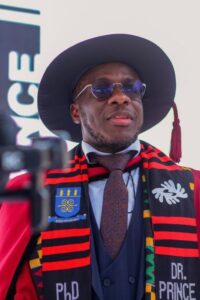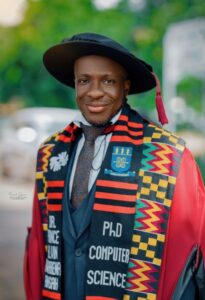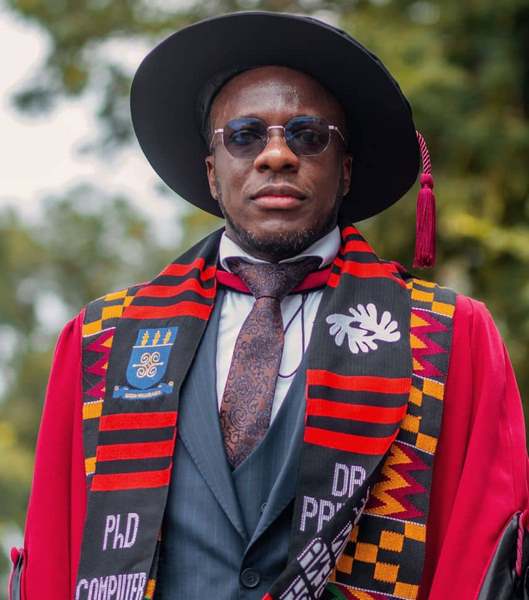In the rapidly evolving landscape of technology, few names resonate as profoundly in Ghana as Dr. Prince Alvin KwabenaAnsah.
A seasoned technologist, Dr. Ansah has not only contributed significantly to the nation’s digital transformation but has also positioned himself as a key player in shaping the future of trade and IT in the region.
Following his recent conferment of a Doctorate Degree, Dr. Ansah sat down with NorvanReports to discuss his journey, the challenges he has faced, and his vision for the future—a vision that promises to push the boundaries of what is possible in trade facilitation and information technology.

Dr. Ansah currently serves as the Chief Technology Officer (CTO) of Ghana Link Network Services, a company instrumental in developing the Integrated Customs Management System (ICUMS) that has revolutionized customs operations in Ghana.
Additionally, he is the founder and CTO of Work Smart Ghana Limited, further underscoring his role as a driving force in the nation’s tech sector.
A Milestone Achievement
The attainment of his PhD is a significant milestone for Dr. Ansah, marking the culmination of years of dedication, research, and perseverance. However, for Dr. Ansah, this achievement is merely the beginning of a new chapter.
“Earning my PhD is a huge milestone,” he stated, “but the opportunities ahead are vast.” With his academic credentials now firmly in place, Dr. Ansah aims to cement his status as a thought leader in the field, contributing to discussions that will shape the future of trade and IT on both national and international stages.

He envisions leveraging his newfound knowledge and experience to influence policy and practice, particularly in areas where technology intersects with trade.
“I plan to establish myself as a thought leader in my field, sharing my knowledge through research, speaking engagements, and contributing to discussions that shape the future of trade and IT,” he elaborated.
His ambitions are not limited to theoretical contributions; he also sees himself playing an advisory role to government bodies, international organizations, and private companies, helping them navigate the complexities of modern trade and customs systems.
Challenges in Innovation
Reflecting on his career, Dr. Ansah acknowledged the significant challenges he has faced, particularly in implementing large-scale systems like ICUMS.
“Getting people to adopt new systems isn’t always easy, especially when they’re used to doing things the old way,” he noted.
The transition from legacy systems to more advanced platforms like ICUMS was met with resistance, but through strategic demonstrations of the system’s efficiency and comprehensive training programs, Dr. Ansah and his team were able to facilitate a smoother transition.
The technical challenges associated with developing ICUMS were also considerable. Integrating this system with various other government platforms required meticulous planning and coordination.
“Developing something as complex as ICUMS comes with its own set of technical hurdles, from ensuring everything works together smoothly to keeping data secure,” he explained.
The success of ICUMS has not only sped up the clearance of goods at Ghana’s ports but has also significantly boosted government revenue, underscoring the impact of his work.
One of the most daunting aspects of his role has been balancing the demands of various stakeholders while staying true to his vision.
“Balancing the needs and expectations of various stakeholders while staying true to my vision has been challenging, but it’s also where my leadership has shone,” he reflected.
His ability to mediate between conflicting priorities and find common ground has been instrumental in the success of projects like ICUMS.
Looking Forward: A Vision for the Future
With ICUMS now firmly established, Dr. Ansah is not resting on his laurels. He is already looking ahead to the next wave of innovations that will drive further efficiencies in trade and customs operations. One of the most exciting prospects is the potential integration of artificial intelligence (AI) and machine learning into the ICUMS platform.
“We could start using AI and machine learning to make the system even smarter, such as predicting potential issues in customs processes before they occur,” he suggested. This predictive capability could be a game-changer, allowing customs officers to take preventive action before problems arise.
Dr. Ansah also envisions enhancing the system’s e-tracking capabilities by integrating ICUMS with global tracking systems, providing seamless tracking for shipments crossing multiple borders. This integration would ensure end-to-end visibility, reducing the chances of goods being lost or delayed.
“I plan to integrate with platforms like DHL’s or FedEx’s global tracking systems, allowing real-time updates for traders and giving them complete transparency on the status of their shipments,” he shared.
Further innovations could include the deployment of Internet of Things (IoT) devices at ports to provide real-time updates on shipments. Such advancements would not only reduce delays but also ensure that goods are stored in optimal conditions.
“Imagine our ports equipped with smart sensors that provide real-time updates on shipments. This would help reduce delays and ensure everything is in the right place at the right time,” he mused.
Additionally, Dr. Ansah is exploring the development of dedicated mobile apps for ICUMS, enhancing the user experience for both traders and customs officers. These apps would allow for greater flexibility and efficiency, enabling customs officers to manage tasks on the go and speeding up the clearance process.
A Mentor and Leader
Beyond his technical achievements, Dr. Ansah is committed to mentoring the next generation of technology leaders in Ghana. He believes in the importance of continuous learning and staying abreast of emerging technologies.
“The tech world never stands still, so it’s important to stay on top of the latest trends and tools,” he advised. His efforts to establish a mentorship program within Ghana Link highlight his dedication to nurturing young talent and ensuring that they have the guidance and support needed to succeed.
In a final word of advice to aspiring professionals, Dr. Ansah emphasized the importance of integrity, problem-solving, and ethical conduct in the tech industry.
“Let’s all be ethical and maintain integrity in our work. Security, privacy, and transparency should always be top priorities,” he concluded.
Dr. Ansah’s impact on Ghana’s tech ecosystem is substantial. He has led the development of LinkIntTradeNet, a blockchain-based customs management system for The Gambia, and spearheaded the creation of the Integrated Customs Management Systems (ICUMS) for the Ghana Revenue Authority. His work has significantly improved trade facilitation and revenue collection for the Ghanaian government.
In the private sector, Dr. Ansah played a crucial role in deploying Ghana’s first 4G network during his tenure at DiscoveryTel Ghana Limited, marking a significant leap in the country’s internet infrastructure.
Beyond his professional achievements, Dr. Ansah is known for his philanthropic efforts, focusing on bringing sustainable technological solutions to underprivileged communities. His vision for a more inclusive digital future aligns with global efforts to bridge the digital divide.
Dr. Prince Alvin KwabenaAnsah’s journey is a testament to the transformative power of technology when coupled with visionary leadership and a commitment to excellence.
As he continues to push the envelope in Ghana’s tech sector, his contributions are likely to have a lasting impact, not just on the industry, but on the nation as a whole.
Source: Norvan Acquah
ALSO READ:
Boakye Agyarko: Where are we headed?
The strange case of Ghana “first” gold refinery & its “broke”…
COCOBOD invests ¢943m in cocoa rehabilitation, confident of producing 800k tons…

